

How Tumblr is Changing Journalism. Earlier this week we looked at the remarkable growth of Tumblr, a blogging and curation service that now gets over 12 billion page views per month.
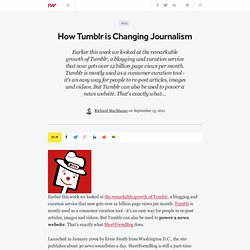
Tumblr is mostly used as a consumer curation tool - it's an easy way for people to re-post articles, images and videos. But Tumblr can also be used to power a news website. That's exactly what ShortFormBlog does. Launched in January 2009 by Ernie Smith from Washington D.C., the site publishes about 30 news soundbites a day. ShortFormBlog is still a part-time project for Smith, who also works as a graphic designer at The Washington Post. Vendre ses photos et vidéos sur Citizenside.
Toolkit for better and accurate reporting. The Media Map: Who's Reading What And Where [Interactive] Ce que le déclin des contributions sur Facebook nous dit de l’avenir de l’info. Vous avez peut-être manqué la publication au mois d'août de l'étude GlobalWebIndex : un passionnant ensemble de chiffres et d'analyses qui recense les usages web et mobile dans le monde.
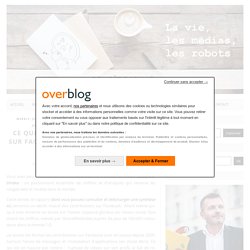
Cette année, le rapport (dont vous pouvez consulter et télécharger une synthèse ici) annonce un déclin massif des contributions sur Facebook. Allant même jusqu'à oser émettre un doute sur l'avenir supposé glorieux du réseau social. Que disent les chiffres relevés par GlobalWebIndex auprès de plus de 100.000 utilisateurs dans le monde ? Q ue toutes les formes de contributions sur Facebook sont en baisse depuis 2009. Homepage - European Journalism Centre. Who Makes the News. Misinformation: Why it sticks and how to fix it. Childhood vaccines do not cause autism.
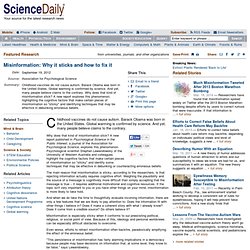
Barack Obama was born in the United States. Global warming is confirmed by science. And yet, many people believe claims to the contrary. Why does that kind of misinformation stick? A new report published in Psychological Science in the Public Interest, a journal of the Association for Psychological Science, explores this phenomenon. The main reason that misinformation is sticky, according to the researchers, is that rejecting information actually requires cognitive effort. Columbia Journalism Review. Public Intelligence Blog. Human-assisted reporting, mass intelligence, and mobile mobile mobile: What we learned at ISOJ. Nieman Journalism Lab » Pushing to the Future of Journalism.
The Pulitzer Prizes. Scraping for… by Paul Bradshaw. Scraping - getting a computer to capture information from online sources - is one of the most powerful techniques for data-savvy journalists who want to get to the story first, or find exclusives that no one else has spotted.
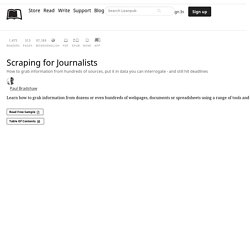
We Are Media - home. Media Watch. Sousveillance. Child's drawing illustrating surveillance versus sousveillance Surveillance as compared with sousveillance Sousveillance (/suːˈveɪləns/ soo-VAY-ləns; French pronunciation: [suvɛjɑ̃s]) is most commonly defined as the recording of an activity by a participant in the activity[1][2][3][4] typically by way of small wearable or portable personal technologies.[5][6][7][8][9][10][11] Alternative definitions of both sur- and sous- veillance (the act of watching), in addition to the definition above, include: Surveillance is defined as cameras (or other sensors) affixed to property (real-estate, e.g. land, by way of posts or poles, or buildings), whereas sousveillance is defined as cameras (or other sensors) borne by people.[12][13][14][15]Surveillance is the veillance of the authority (i.e. the veillance that has the capacity to prohibit other veillances), whereas sousveillance is the veillance of plurality (i.e.
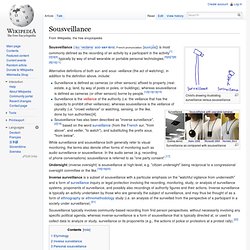
The Participatory Panopticon vs. The Pentagon. The Participatory Panopticon vs.
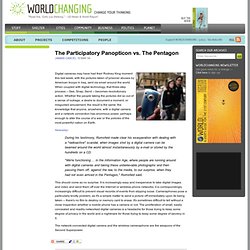
The Pentagon Digital cameras may have had their Rodney King moment this last week, with the pictures taken of prisoner abuses by American troops in Iraq, sent via email around the world. The Rise of the Participatory Panopticon. This week, I spoke at the first MeshForum conference, held in Chicago. The following is an adaptation of my talk, which adapts some earlier material with some new observations. Category:Types of journalism. Participatory Media Literacy / Participatory Media Literacy. Guide To This Site's Contents Welcome to Participatory Media Literacy (Home)BloggingWikiRSSSocial Bookmarking, Tagging, Music/Photo/Video SharingPodcastingVideo BloggingDigital Video ResourcesDigital StorytellingMashupsChat: Channeling the BackchannelTransliteracyForecasting: Thinking long term, developing foresight Participatory Media Education Resources Recent technological changes have made much wider social changes possible: Until the end of the twentieth century, only a relatively small and wealthy fraction of the human race could broadcast television programs, publish newspapers, create encyclopedias; by the twenty first century, however, inexpensive digital computers and ubiquitous Internet access made the means of high quality media production and distribution accessible to a substantial portion of the world's population.
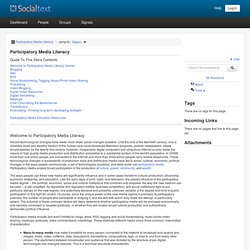
In 20068, more than one billion people are connected to the Internet and more than three billion people carry mobile telephones. Journalism 2.0: How to Survive and Thrive. Five frameworks to build strategies for the future of media. We are big believers in the power of visual frameworks to help people understand complex landscapes and build effective strategies.
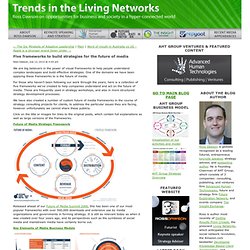
One of the domains we have been applying these frameworks to is the future of media. Media Democracy Days Vancouver. Home » Future Journalism Project. Global Voices · Citizen media stories from around the world. New Media Makers Toolkit. The Data Journalism Handbook. Nytlabs. Data driven journalism. Data-driven journalism, often shortened to "ddj", is a term in use since 2009/2010, to describe a journalistic process based on analyzing and filtering large data sets for the purpose of creating a news story.
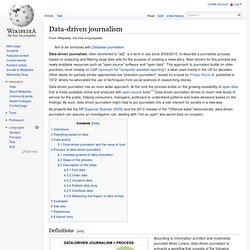
Bienvenue. Wikinews. The inverted pyramid of data journalism. CyberJournalist.net. The Street Wire. Reda Benkirane Home Page - The Alchemy of Revolution. Geneva Centre for Security PolicyGCSP Policy Paper 2012/7 The Alchemy of Revolution: The Role of Social Networks and New Media in the Arab Spring by Reda Benkirane (PDF) "if 2011 was a year of Arab collective therapy whereby ICTs’ role facilitated the liberation process, then 2012 is the year of psychological depression and political regression/repression due to the control made possible by the same ICTs” “Technology is a pharmakon; a remedy that can heal and a poison that can kill” Key Points The rise of Arab bloggers and cyber activists is not the product of a spontaneous generation.
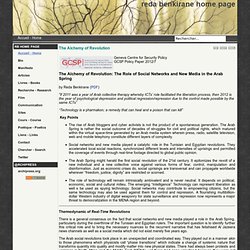
News: Media: Participatory. Journalistiques. International Consortium of Investigative Journalists. List of citizen journalism websites. Tools for citizen journalism. Tools for citizen journalism enable people other than traditional mass media professionals to gather, edit and share information through internet and other low-cost publishing systems. Handbooks Handbook for Bloggers and Cyber-dissidents, published by Reporters Without Borders, September 2005, offers advice on how to start a blog, and get it picked up by search engines, along with ethical guidelines and recommmendations for the best tool to use, as well as information on how to blog anonymously and technical ways to get around censorship.How to Blog is a weblog devoted to sharing blogging tips and tricks, theme and plugin info and blogging software reviews.Into the Blogosphere provides scholarly analysis of "discursive, visual, social, and other communicative features of weblogs.
" Blog hosting services The following services offer online hosting of blogs. Users do not need any additional tools beyond a standard web browser. Blogging tools Reviews. Storyful. List of data journalism tools. How to: use social media in newsgathering. Credit: Image by Pedro Lozano on Flickr. Creative commons licence. Some rights reserved. Finding sources, nurturing contacts and checking facts by phone have long been key to successful journalism. AgoraVox le média citoyen.
AgoraVox. Un article de Wikipédia, l'encyclopédie libre. NaturaVox : partager pour préserver. User Generate Content. Contenu généré par les utilisateurs. Un article de Wikipédia, l'encyclopédie libre. Pour les articles homonymes, voir UGC. Le contenu généré par les utilisateurs (en anglais User-generated content, ou UGC) se réfère à un ensemble de médias dont le contenu est principalement, soit produit soit directement influencé par les utilisateurs finaux.
Il est opposé au contenu traditionnel produit, vendu ou diffusé par les entreprises de média traditionnelles. Le terme devint populaire pendant l'année 2005, dans les milieux du Web 2.0, ainsi que dans les nouveaux médias. Ce mouvement reflète la démocratisation des moyens de production audiovisuelle grâce aux nouvelles technologies. Le contenu généré par les utilisateurs est aussi considéré, par ceux qui le pratiquent, comme un excellent moyen pour améliorer leurs compétences, pour s'instruire, pour découvrir et explorer de nouveaux domaines [citation nécessaire]. Home. The News is NowPublic. Falkvinge on Infopolicy - Discussions on information policy and civil liberties. Citizen journalism.
The concept of citizen journalism (also known as "public", "participatory", "democratic",[1] "guerrilla"[2] or "street" journalism[3]) is based upon public citizens "playing an active role in the process of collecting, reporting, analyzing, and disseminating news and information. "[4] Similarly, Courtney C. Journalisme citoyen. Un article de Wikipédia, l'encyclopédie libre. Le journalisme citoyen est un aspect particulier du média citoyen qui est l'utilisation des outils de communication, notamment ceux apportés par Internet (site web, blog, forum, wiki...), par des millions de particuliers dans le monde comme moyens de création, d'expression, de documentation et d'information.
Il y a un certain renversement dans ce domaine, le citoyen passant du rôle de simple récepteur à celui d'émetteur, devenant lui-même un média. Comment se construire de fausses croyances ? Mots-clés : sciencescognitives, décision, croyances. Research Skills Training by Colin Meek. Columbia Journalism Review. UNESCO Launches Free Online Course on Media and Information Literacy « Media Rights Agenda. The United Nations Educational, Scientific and Cultural Organization (UNESCO) has launched a free online course that supports Media and Information Literacy (MIL) and Intercultural Dialogue. The course which is designed for teachers, policy makers and professionals will be offered over 13 weeks, from February 25 to May 31, 2013 and will be led by the Queensland University of Technology (QUT) in Australia. UNESCO’s Assistant Director-General for Communication and Information, Mr. Janis Karklins Explaining the rationale for the course, Mr.